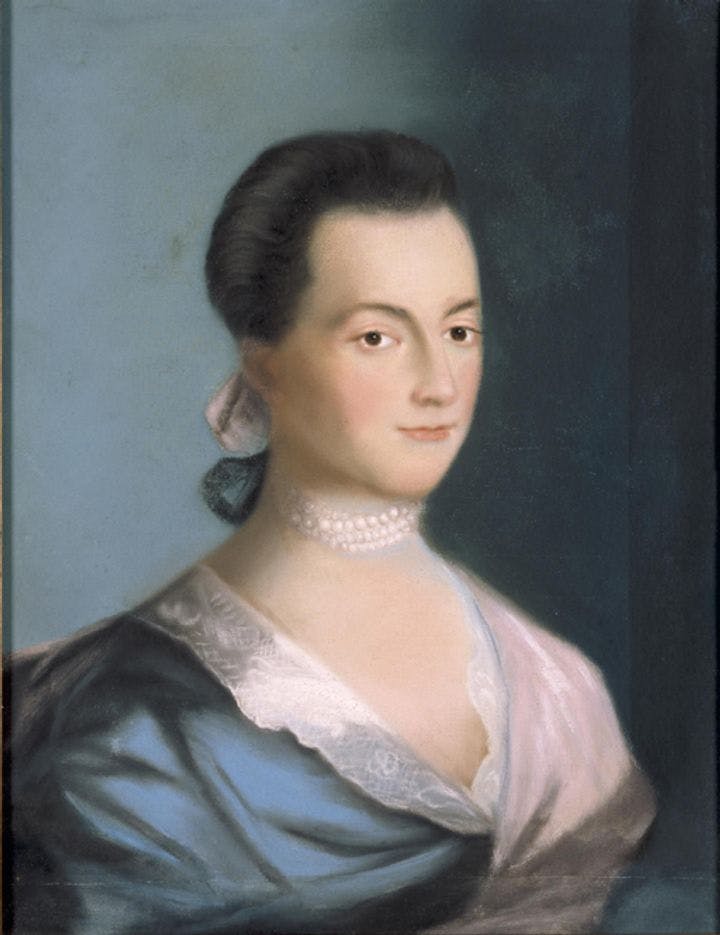Winter 2010
A Revolutionary Woman
– Frank Shuffelton
Few First Ladies have contributed as much to their husbands' success as Abigail Adams.
In the Founding Fathers’ race for enduring fame, John Adams had a secret resource. Her name was Abigail. Most of the Founders’ wives offered silent support, usually in the form of affectionate encouragement and the management of household and family matters, but few contributed as much to their husbands’ success as Abigail Adams. Previous biographies have tended to emphasize how she embodied the new possibilities for women that emerged with the rise, in the latter 18th century, of companionate marriage, which prized affection over dynastic or economic considerations. “Dearest Friend” was the greeting that opened many of Abigail’s letters to her husband.
Woody Holton’s biography recognizes this aspect of the Adamses’ marriage, but he complicates the picture by showing the stresses and differences of opinion that cropped up between Abigail and John, even if they never became serious rifts. (For instance, in her most famous Remember the Ladies.” What’s less recalled is his jocular response: “I cannot but laugh.”) In Holton’s version of the relationship, Abigail is occasionally a whetstone against which her husband sharpens his thinking. And Holton, a historian at the University of Richmond, shows more fully than earlier biographers how Abigail’s financial acumen created a secure foundation for the Adams family and helped pioneer a new kind of economic empowerment for women.
Well into the 19th century, married women were bound by the legal notion of coverture, which put their property under the control of their husbands. Nevertheless, Abigail drew up a will that disposed of personal property such as dresses and jewelry and also included financial bequests to family members, friends, and dependents—and when she died in 1818, John honored it. Abigail’s resistance to coverture, which in effect suspended a woman’s legal existence while she was married, is a theme of Holton’s book. Abigail’s crusade, however, was a relatively private one. She exercised her “protofeminist ideals within her own household,” he notes. Her will, for instance, opens with the statement that it is made “by and with [her husband’s] consent,” and she typically expressed her resentment at the limits placed upon women in correspondence with female friends and relatives.
Abigail was born in 1744 in Weymouth, Massachusetts, where her father, William Smith, was pastor of the Weymouth church’s north parish. She never attended school, partly because of frequent bouts of ill health, and partly because her parents did not value education for girls beyond reading and basic arithmetic. She was, however, an avid reader, and Holton suggests that an important element of her education was “networks of friends” who recommended books to one another and discussed them in conversation and self-acknowledged vanity, admiring her “Saucyness” and calling her “Miss Adorable.” They married when she was 20.
The Adamses’ 54-year marriage was marked by long periods of separation, beginning with John’s travels as a young lawyer on the court circuit and extending through his many years as a national public servant beginning in 1774. When left on her own, Abigail coped with farm labor shortages, illnesses, and four children. She also earned money by providing hard-to-find items including pins, ribbon, and handkerchiefs to Boston merchants. John acquired the wares in Philadelphia and later in Europe at a favorable price, and by reselling through agents she could avoid the appearance of impropriety—proper ladies were not supposed to be in business.
During the Revolution, she accumulated a tidy nest egg that she invested in state and national bonds bought at steep discounts and eventually redeemed at par, dealings of which her husband was not always fully aware. Her financial enterprises, along with the couple’s thriftiness, laid the basis for the fortune that kept the family afloat during the hard times after the Revolution that wrecked other members of the founding generation.
Holton’s biography stands out for its treatment of Abigail’s entrepreneurship, and if earlier biographers have discussed her proto-feminist opinions, he is often more thorough and nuanced than they were. His skillful use of primary sources, including Adams family correspondence, affords a fuller understanding of events in Abigail Adams’s life than we have had. Holton’s biography is required reading for anyone interested in the Adams family.
* * *
Frank Shuffelton edited The Letters of John and Abigail Adams (2004) and The Cambridge Companion to Thomas Jefferson (2009).
Reviewed: "Abigail Adams" by Woody Holton, Free Press, 2009.
Image courtesy of Wikimedia Commons
